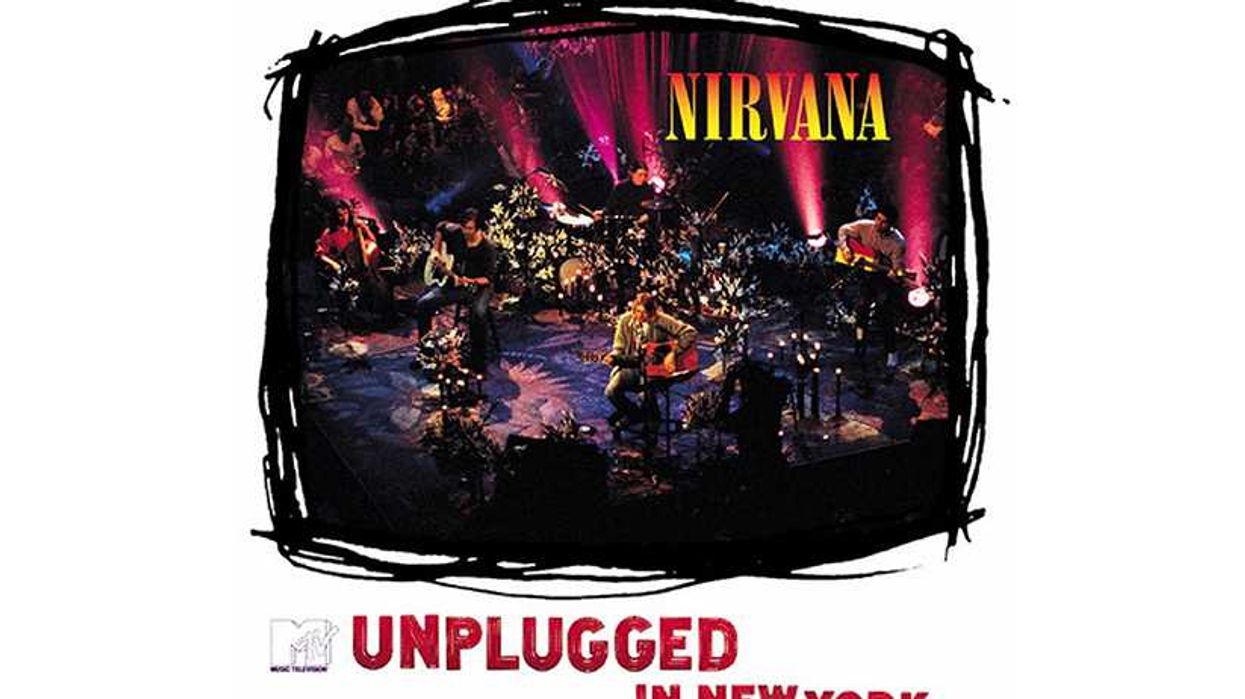Hempstead, Long Island’s Glassjaw have been flying the flag for independent post-hardcore since the release of their Ross Robinson-produced debut album, Everything You Ever Wanted to Know About Silence, in 2000. The sound of the band’s fearless experimentation and metallic edge has earned them a rabid worldwide fan base. Yet Glassjaw have been plagued by struggles and unplanned hiatuses that have kept these loyal fans unsure, at times, of the band’s very existence. Thankfully, with the recent release of Material Control, their first full-length album in 15 years, Glassjaw’s main aural architects, guitarist and bassist Justin Beck and singer Daryl Palumbo, have put the group back in the spotlight.
Post-hardcore is a genre that has enjoyed an extremely loyal following since its advent in the early 1980s, with seminal bands like Minor Threat and Big Black. But it received a sonic shot in the arm in the early 2000s, with the debut albums from At the Drive-In and Glassjaw, among others. A whole new mass of diehards became hungry for the genre’s punk-tinged experimentation. Only two years after their debut, Glassjaw followed with the equally menacing Worship and Tribute. While that album cemented the band’s legacy in the post-hardcore world, it would prove to be the last full-length Glassjaw would record until now.
Proponents could rely on Glassjaw to occasionally rise from the ashes with new music that challenged them while pushing the band’s art forward and re-energizing the genre. Via a revolving-door lineup of bandmates, Beck and Palumbo managed sporadic releases—three EPs—and undertook short tours and one-offs under the Glassjaw banner.
But more recently, Beck and Palumbo rediscovered the band’s essense, and that’s exactly the pulse behind Material Control. “When we were young,” says Beck, “it was not about being rock stars or to travel the world, but just to play music that we like. That’s always been the driving factor.”
Material Control is a potent return, with all of the primal intensity and far-reaching musical ideas that put Glassjaw on the map, but in more streamlined form. It’s an album that was crafted from a place of simple and visceral reaction to the everyday stresses and challenges we all face. “I think there’s overcompensation when you’re young,” says Beck. “But sometimes, it’s simpler things that are much more impactful.”
While “simpler” may be the way Beck describes the album, the second the opening track, “New White Extremity,” begins shaking your speakers, it is the last word you’d use to describe it. Material Control is a hurricane of punishing bass-driven riffs, atonal guitar flourishes, ambient interludes, and grooves that shift on a dime. While “Closer” proudly boasts the pummeling energy of hardcore, the instrumental title track is propelled by an absolutely filthy drum groove and a clean, finger-tapped guitar melody, lasting only long enough to refresh the listener for the next gut-rattling opus.
Material Control continues to garner raves from critics and fans. And according to Beck, who gave Premier Guitar the lowdown on his dual role as the band’s guitarist and bassist, Glassjaw are now free to embrace a new age of musical experimentation and output. So, for the time being, it seems like all the pieces of Glassjaw’s daring, sonically adventurous puzzle are fitting into place—with the energy and invention that made the band earth-shaking still intact.
It’s been 15 years since Glassjaw’s previous album, and yet Material Control sounds ferocious. How were you able to come back with such energy after all that time?
Coming back to do a full length, we went back to the question: “Why’d we start the band?” I wanted to be on Revelation Records, which was an old punk-rock label that’s still around. That was the epitome of making it in our world when we were young—just to be on this cool fucking label and put out a 7". So we got together a couple of weekends and just hammered Material Control out. It came together organically, with no big pictures. It was like, “Let’s just jam as if we were 13 again.”
As far as the aggressive state of the music, that’s relative. I think for us, there’s enough anxiety and real-life situations that drive you fucking crazy. Just regular life and being a civilian, and having the same gripes as everybody else. You go out, and you vent, and put it to tape.
How would you describe the evolution of your sound from the early days to Material Control?
The band’s desires have always been exactly what Material Control is. I hate it when people say, “We’ve evolved and we’ve matured.” But I would say that we’re not as shitty and as immature as we were in the past.

Beck and Palumbo chose to self-produce the new album. “A producer is filtering it,” says Beck. “And along with that filtering comes process, time, cost, pressures, and expectations.”
One thing that struck me about Material Control is how, through the chaos, there is always something for your ear to catch onto. Is that part of what you were reaching for?
You’re always trying to throw in some flair—something that emotionally lifts you and pulls you down, then pulls you left and right. If there is any emotional journey that our little ability allows us to do, we’re going to try to implement it so you feel like the song is taking you somewhere. Whether it’s a clever drum beat, or a catchy bass lick, or a sweet melody on a guitar … it’s a matter of sprinkling them in.
You played everything on the album except drums, so the pressure to create that push and pull was on you. Tell me about the recording process you used to capture that.
We did it ourselves. We were going to record the drums at my warehouse, but Billy [Rymer, of Dillinger Escape Plan and the principal drummer on Material Control] had a friend with a studio where he would record, further out east on Long Island, called VuDu Studios. We went to his studio and the drums were already set up. We tracked from something like 10 a.m. to 10 p.m., and that was it. Drums were done. Then we took those tracks and Daryl did his portion at his studio, and I did the guitar and bass at my house. For the most part—all the production—we did it ourselves.
Guitarist/bassist Justin Beck (left) and vocalist Daryl Palumbo formed Glassjaw in 1993, after meeting at summer camp. Sixteen other players have passed through the band since then, but the group’s core sound and approach have held to their artistic true north.
Why self-produce?
A lot of people don’t realize that when you’re in bands with labels and producers, everyone has an opinion. Something that should be a hobby becomes this weird black hole of emotional blackmail, and everybody hates each other. It just gets so much more complicated and kind of sucks the fun out of it.
So for this one, it was the cleanest way, in an emotional sense. If we had an idea, the judge and jury were two people. The objective we were going for is to put a record out to document what we were vibing at the moment. It worked because it was unfiltered, you know? A producer is filtering it. And along with that filtering comes process, time, cost, pressures, and expectations.
Your guitar parts on the album really give the bass a lot of room to propel the songs. Did you write the guitar parts with the bass lines already in mind?
If I had to break it down, I would say I’ve always been a bigger fan of the bass. If I was just a guitar player in the band and someone else is playing the bass, I might feel my ego was crushed. But because I was playing both, my ego isn’t hurt and I don’t mind my other personality sitting behind.
People have really neglected the bass, especially in metal. They think it’s just something to fill the subs in. But it’s melodic, it’s progressive, and it has so much power.
The power definitely comes through on the album. How did you get that grinding bass sound?
Back in the day, we used to play with SVTs and some basic overdrives. And then around 2000 to 2001, Line 6 came out with the Bass POD Pro. I ended up picking up that unit and emulating that tone. And that’s been my tone for the last 18 years.
But part of the tone is how you’re using the pick against the string. So it’s almost like you’re side-swiping the string. You’re yielding an almost slap effect when you’re constantly down-strumming. It gives a very direct attack. You look like a caveman playing, but it gives a certain tonality.
How do you see your role on guitar within Glassjaw?
I’m a songwriter first. When I first picked up a guitar and wanted to play in a band, Glassjaw was starting but already had a guitarist, so I ended up becoming the drummer. Then we found a better drummer, and our bass player left for India to become a Hare Krishna. So I switched to bass.

Guitars
Les Paul Deluxe
Les Paul Classics with EMG 81 pickups
Music Man StingRay RS
Basses
late-’80s Fender P/J bass
Amps
Hughes & Kettner TriAmp
’90s Top Hat head
Marshall 2x12 with Celestion Vintage 30s
Kemper Profiler (live)
Bass Amps
Line 6 Bass POD Pro
Ampeg SVT head
Ampeg 1x15 cab
Effects
Dunlop Cry Baby
Strings and Picks
DR sets (.010–.052)
Dunlop nylon .88 mm
And then I eventually came back to guitar years later. Guitar is definitely my weakest instrument out of any I’ve ever played. The dudes in Animals as Leaders … they’re guitar players. I’m not a guitar player.
But on the album, you shift from intense metal riffs to something ambient to a clean-toned tapping passage. You cover a lot of ground.
On some of the older catalog, we were young and ambitious. You like so many different types of music and to try to cram it into one voicing. So, it’s like a poor man’s George Benson meets Dr. Know from Bad Brains. You’re trying to cover it all. But with Material Control, it’s creative discovery. For this record, I felt like the guitar is more of a background color. And it called for ambient coloring. The bass is kind of driving the rhythm, the melody. I feel like the guitar is 10 percent of the composition, if that makes sense. It’s more of a color and a timbre than a driving force.
What guitar amps did you use to get the heavy sound that sits so well in the mix?
I used an amp we picked up in, like, ’99. It’s an old Top Hat. It’s like a classic-Marshall type of tone that’s not too gritty. And we bi-amped it with an old Hughes & Kettner TriAmp, but the first iteration, before the Mark 1. It’s not as muddy as a Dual Rec. It’s got more balls than a Marshall. It’s right up in that middle zone—a good distorted rock amp.
Did you get all your drive from the amps?
Yeah. Unlike the bass, the guitar was done in a traditional sense. I’d say that using the Kettner was probably 70 perent of the blend, and the Top Hat was added for a little more clarity.
You’re known for playing Les Paul Classics. Is that what you played on the album?
I had a Les Paul Deluxe. My go-to for years was the Classic. And I would hype them up with EMG 81s because I always felt my amps on the road would always be shy on output. So I’d overcompensate with the active pickups. But it was little too much. So, on this recording, I took an old white Deluxe that I had for years, and the thing was banging. I didn’t need to fuck with it. I just left it as is.
Justin Beck plays bass and guitar on the band’s new album, but live he sticks to 6-string. His current stage go-to is a Music Man StingRay, but he also keeps various Les Pauls in his arsenal—like this one he played on the 2003 Warped Tour.
Photo by Dan Locke/Frank White Photo Agency
In the past, Glassjaw often played songs live for years before they got recorded. But for Material Control, almost all of the songs were untested onstage.
One song was an old song from probably, like, 2000. It’s the third song on the album, “Citizen.” It was a song that, for whatever reason, didn’t make it to a record. And then the only other piece that was really kind of old was “Golgotha.” The music, all the stringed instruments, and vocals were brand new, but the drum beat was a beat I had from ’99 or 2000.
Billy Rymer played drums on the album. What did he bring to the sound?
Billy’s fucking superhuman. As schooled and proficient as he is, he still has a little Keith Moon in him, where he’s just bat-shit fucking crazy. And it definitely helps the songs feel human and organic and punk rock. If we had a different drummer, the record wouldn’t have breathed the way it does. So I think Billy brought a level of youth and anxiety to help keep the flow the way it should’ve flowed.
And he tracked the whole record in one day. We really literally went in thinking, “Let’s just do each track twice and move on.” And this kid fucking did it! He could’ve kept on going another 24 hours. The kid was insane.
The band has often used unique methods to get music to fans. For this album, you actually sent a free collection of flexi-discs to a lot of your fan base. In the age of Spotify and downloading, why something so unique?
It’s just connectivity, you know? It’s just knowing your people, knowing who your fans are, and speaking the right dialogue. And for us, that music kid is someone similar to Daryl and myself. And if somebody we like spoke to us like that, we’d be fucking over the moon. We’d love it. So something like that was just a simple form of reciprocating and showing fans a level of appreciation. It’s like, “Thanks for waiting.”
left and right.”
A previous surprise for your fans was giving away your EP Coloring Book right after the release of the singles-collection EP, Our Color Green. Are there any recordings in the archives that fans should be waiting for?
There’s definitely some B tracks and other ideas that are brewing. The hardest part is that the public is still very much trained to fully acknowledge an LP versus an EP. But now, with the new LP out of the way, I think the gloves are off. So it’s like, “Dude, you want to drop a song tomorrow?” And we could drop a song tomorrow. If anything, more is going to come, because now we can do it piecemeal without people giving us shit that we didn’t drop a full-length record. Now will probably be the most fertile season for us, in the upcoming months to years.
What’s next? Will you guys be touring?
I think we have some tours coming up—nothing too crazy. And after that, especially with our current lineup, I think, we can do anything at this point. I feel it’s, “The record is done, now let’s do a jazz EP or whatever the fuck.” It could be anything. The impulse writes the narrative moreso than something like a big master plan. And our drummer Chad Hasty and our bass player Travis Sykes … I mean, these kids are real musicians. These kids are Berklee kids. So the things we could do now are limitless.
You guys are fiercely independent and you’ve been together for 25 years. What keeps bringing you back to Glassjaw and how do you maintain its energy?Because I’m running out of music to hear. I’m running out of shit for me to listen to, and no band does what I want to hear. So it’s a complete selfish, personal conquest and hobby. I like to hear the music in my head that nobody is doing.
Justin Beck wields his Music Man StingRay RS 6-string in the official video for “Shira,” from Material Control. It’s his main stage guitar, although he primarily relied on a Gibson Les Paul Deluxe for recording the new album.

















![Rig Rundown: Russian Circles’ Mike Sullivan [2025]](https://www.premierguitar.com/media-library/youtube.jpg?id=62303631&width=1245&height=700&quality=70&coordinates=0%2C0%2C0%2C0)
















![Rig Rundown: AFI [2025]](https://www.premierguitar.com/media-library/youtube.jpg?id=62064741&width=1245&height=700&quality=70&coordinates=0%2C0%2C0%2C0)




















 Zach loves his Sovtek Mig 60 head, which he plays through a cab he built himself at a pipe-organ shop in Denver. Every glue joint is lined with thin leather for maximum air tightness, and it’s stocked with Celestion G12M Greenback speakers.
Zach loves his Sovtek Mig 60 head, which he plays through a cab he built himself at a pipe-organ shop in Denver. Every glue joint is lined with thin leather for maximum air tightness, and it’s stocked with Celestion G12M Greenback speakers.






